[Our method, on these expeditions, was to steer by compass, noting the different courses as we proceeded; and counting the number of paces, of which two thousand two hundred, on good ground, were allowed to be a mile. At night when we halted, all these courses were separately cast up, and worked by a traverse table, in the manner a ship’s reckoning is kept, so that by observing this precaution, we always knew exactly where we were, and how far from home; an unspeakable advantage in a new country, where one hill, and one tree, is so like another that fatal wanderings would ensue without it. This arduous task was always allotted to Mr. Dawes who, from habit and superior skill, performed it almost without a stop, or an interruption of conversation: to any other man, on such terms, it would have been impracticable.]
At a very short distance from Rose Hill, we found that they were in a country unknown to them, so that the farther they went the more dependent on us they became, being absolute strangers inland. To convey to their understandings the intention of our journey was impossible. For, perhaps, no words could unfold to an Indian the motives of curiosity which induce men to encounter labour, fatigue and pain, when they might remain in repose at home, with a sufficiency of food. We asked Colbee the name of the people who live inland, and he called them Boorooberongal; and said they were bad, whence we conjectured that they sometimes war with those on the sea coast, by whom they were undoubtedly driven up the country from the fishing ground, that it might not be overstocked; the weaker here, as in every other country, giving way to the stronger.
We asked how they lived. He said, on birds and animals, having no fish. Their laziness appeared strongly when we halted, for they refused to draw water or to cleave wood to make a fire; but as soon as it was kindled (having first well stuffed themselves), they lay down before it and fell asleep. About an hour after sunset, as we were chatting by the fire side and preparing to go to rest, we heard voices at a little distance in the wood. Our natives caught the sound instantaneously and, bidding us be silent, listened attentively to the quarter whence it had proceeded. In a few minutes we heard the voices plainly; and, wishing exceedingly to open a communication with this tribe, we begged our natives to call to them, and bid them to come to us, to assure them of good treatment, and that they should have something given them to eat. Colbee no longer hesitated, but gave them the signal of invitation, in a loud hollow cry. After some whooping and shouting on both sides, a man with a lighted stick in his hand advanced near enough to converse with us. The first words which we could distinctly understand were, ‘I am Colbee, of the tribe of Cadigal.’ The stranger replied, ‘I am Bereewan, of the tribe of Boorooberongal.’ Boladeree informed him also of his name and that we




